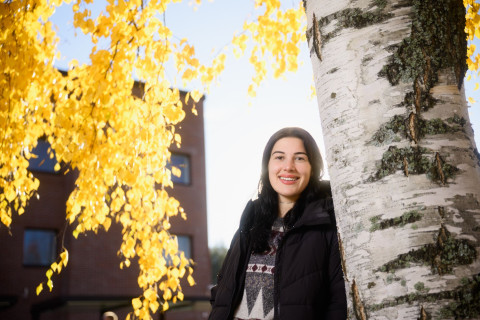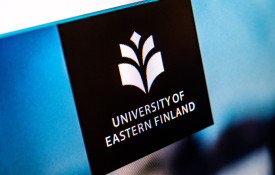Interested in a career in public health, environmental law or chemistry? Want to change the way we think about societies, cultures, the environment and well-being? Are you ready for an experience of a lifetime? The University of Eastern Finland offers a wide range of study programmes taught in English, all of them designed to open the door to the career of your dreams!
UEF is one of the leading multidisciplinary universities in Finland, as well as a university that is internationally recognised for its state-of-the-art research. Our study programmes are of a high standard and they are built on high-level research seeking to find interdisciplinary solutions to global challenges.
UEF offers a great variety of Master’s and Bachelor's degree programmes taught in English, as well as non-degree programmes that cater, in particular, to the needs of exchange students. Many of our Master’s degree students stay on board at UEF to continue their studies in our doctoral programmes.
1,700
International students
100
Nationalities of students
35
International degree programmes
Bachelor's and Master's degree programmes
The University of Eastern Finland offers three Bachelor's degree programmes and a wide variety of Master's degree programmes taught in English. The application period to the Bachelor’s and Master’s degree programmes taught in English opens in January 2026.

Finland is unique
Amazing nature, four seasons, Northern lights and white nights. We have 3,2 million saunas in country of 5,6 million people. And yes, Santa Claus lives here, he really does.
The University of Eastern Finland, UEF, is one of the largest universities in Finland. We have some 17,000 degree students at UEF, and our beautiful, compact campuses are home to a nice mix of Finnish and international students.

What to expect in Finland and at UEF
Finland is often ranked as the happiest country in the world but what does that really mean? In Finland happiness often comes from trust in society, excellent education, and the freedom to live life in your own way.
As a student arriving in Finland, you will likely notice the fresh air, clean surroundings, reliable public services, and a safe, peaceful atmosphere. Nature is never far away, and people value privacy, independence, and a healthy work–life balance. For many, this is refreshing, but it can also feel different if you are used to a busier or more social environment.
It is good to remember that even in the “happiest” country, life has its challenges. Winters can be long and dark, and building close friendships with locals may take time. Learning some Finnish can open doors, and many international students come to appreciate the calm pace of life, the sense of safety, and the strong quality of life here.
Short answers for the common questions about studying in Finland can be found below. Detailed information is gathered to Practical guides for international students, Joensuu and Kuopio campuses. Guides are downloadable from link.
- Finland can be expensive, so make sure you have the funds to cover your entire study period before arriving. Students from outside the EU/EEA are not covered by the Finnish social security system, so you will need valid health insurance and personal funds. Please see the official financial requirements from Migri.
- Basic student healthcare is included in the mandatory Student Union membership fee for degree students. This is not full medical coverage, so non-EU/EEA students should have private insurance as well.
- UEF’s campus cities, Joensuu and Kuopio, may feel small compared to major international hubs, but they offer a lively student atmosphere, a close-knit community, and easy access to beautiful nature.
- Part-time jobs are possible, but many jobs require Finnish language skills. Students on a residence permit are allowed to work limited hours, but you should never depend on part-time work to fund your studies or life in Finland.
- The student residence permit is designed for full-time studies, so financially supporting a family in Finland or abroad while studying is usually not realistic.
Finland is generally considered a relatively expensive country. While the Finnish Immigration Service (Migri) sets a minimum requirement of €800 per month for a student residence permit for non-EU/EEA students, we recommend budgeting a bit more, around €900–€1000 per month, to comfortably cover essential living costs, including food, accommodation, and local travel.
Please see Finnish Immigration service website for more information.
Independent, non-profit student housing companies in Joensuu and Kuopio offer housing for single students as well as students with families. There are no on-campus dormitories available. For more information, please see Kamu students' handbook.
Student housing companies in our campus cities:
- Student housing in Joensuu: joensuunelli.fi
- Student housing in Kuopio: kuopas.fi
EU citizens and citizens of Iceland, Liechtenstein, Norway and Switzerland can enter Finland freely, but they must register their right to reside in Finland if staying for more than three months.
The Finnish Immigration Service (Migri) is responsible for issuing residence permits in Finland. You can apply for a study-based continuous residence permit (type A) for the entire duration of your studies. Application process can take time, and the student should be prepared to visit to a Finnish mission for identification. Allow at least three months for processing, or possibly longer. You need to have a valid residence permit before arriving in Finland and starting your studies.
For more information:
- Residence permits for students (Finnish Immigration Service)
- Residence permits for PhD students (Finnish Immigration Service)
- Finnish diplomatic missions abroad
- Income requirements for students with families
It is not possible to apply to our university solely for the purpose of studying Finnish. Neither do we offer any preparatory Finnish courses that aim to train students to study in our Finnish degree programmes.
Students who have been admitted to study at the University of Eastern Finland can choose Finnish language studies offered by the Language Centre free of charge. Further information can be found in Kamu student handbook.
The University of Eastern Finland requires that all incoming international students must have a valid personal (travel) insurance policy from an internationally recognized insurance agency for the whole duration of their stay in Finland. Read our Kamu Student Handbook about the insurance cover for students.
Finnish Student Health Service (FSHS) provides all Bachelor’s and Master’s degree students of the University of Eastern Finland, with preventive health care, medical care, mental health care, and dental care. FSHS provides health services only for degree students (not available for exchange students) who have paid the Student Union membership fee. Read our Kamu Student Handbook about the student health care.
Finland has four distinctive seasons: spring, summer, autumn and winter. The highest daytime temperature in eastern Finland during the summer occasionally rises over 25°C (degrees Celsius). During the winter months, particularly in January and February, temperatures of minus 20°C are common. Due to the low humidity, however, Finland's climate is actually not as cold as temperature readings might seem to indicate.
In eastern Finland first snow settles in late October or in November, and the landscape will usually be covered with snow in December. The first signs of spring can be seen in March, and in April the snow gradually starts melting away. Still, there might be some snow left even in the beginning of May.
Finland has two official languages, Finnish and Swedish. However, knowledge of Finnish language is not necessary for studying in our degree programmes taught in English. However, studying Finnish before and during your studies is recommended. Knowledge of Finnish helps students to integrate into the everyday life in Finland.
For more information and links to learning Finnish online, please see infoFinland.fi.
International students from non-EU/EEA countries are allowed to work in Finland on student's residence permit (without a work permit) for a maximum of 30 hours per week. Students from the EU/EEA countries do not need work permits at all.
Please note that finding a job without excellent knowledge of the Finnish language is very difficult.
For more information: Employment and Economic Development Office
The non-European citizens studying in an international Bachelor's or Master’s degree have tuition fees which are approximately 10,000 € per academic year. The university offers a limited number of tuition waivers and scholarships for international degree students required to pay tuition fees. There are no tuition fees for the EU and EEA citizens.
For more information: Tuition fees and waivers
I was convinced to apply after hearing only positive things about the innovative teaching methods and the high quality of education that Finland overall is famous for.
Ria Talukder, MDP in Photonics student

Student and alumni stories
Get excited about learning!
Students stand at the core of learning environment development at UEF. We are creating the best academic learning environment in Finland, one that is built around a high standard of education, inspirational teaching methods, open learning, comfortable facility solutions and modern technology.

Sign up for our newsletter
Interested in studying at UEF? Click here and subscibe to our newsletter about the programme you are interested in.
On the move blog
This blog gives you glimpses into what it's like to be a UEFian and on the move. Here you will find posts by our students, teachers and other staff members who are taking part in a mobility scheme.
Further information
Bachelor's and Master's degree studies: Pleas contact us at [email protected]
Doctoral applicants: Doctoral applicants are encouraged to contact the appropriate faculty or department directly. Please find further information from the UEF Doctoral School website.
Exchange students: International Mobility Services, [email protected]























